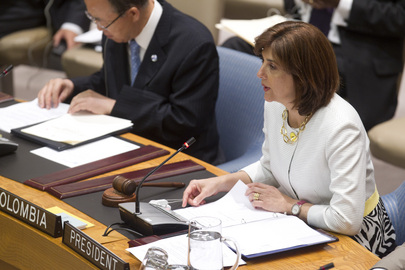Open Debate on Post-Conflict Peacebuilding
On 12 July 2012, the Security Council held an Open Debate on Post-Conflict Peacebuilding. The discussion, grounded in a recent concept paper entitled, “Post-conflict peacebuilding: report of the Peacebuilding Commission,” focused upon the role of the Peacebuilding Commission (PBC) in facilitating states' transitions from conflict to sustainable peace. The debate did not result in the adoption of an outcome document.

The debate featured 48 statements, including those from the Secretary-General, the former Chairperson of the PBC, the current Chair of the PBC, the Vice-President and Head of Network Operations, Policy, and Country Service of the World Bank, the permanent and non-permanent members of the Security Council, and 29 other member states. The discussion was less attentive to gender than the previous Council debate on this issue: only 8 out of the 48 statements—approximately 17%—addressed the gendered dimension of post-conflict peacebuilding.
Gender Analysis:
Overall, the debate failed to adequately address the gendered aspects of post-conflict peacebuilding. Speakers were primarily concerned with discussing cooperation among international institutions, often focusing on the relationship between the Security Council and the PBC; this had the effect of diverting attention away from gender issues. However, 8 speakers—Burundi, Chile, Mexico, Norway, Portugal, Sweden, Togo, and the United States—addressed the gender implications of the topic.
Several of these speakers stressed the importance of incorporating women's perspectives into post-conflict recovery efforts. Togo noted that such inclusion is critical to the long-term success of any attempt to promote good governance. Sweden reiterated this notion, arguing that commitment to inclusive governance and political reform must involve women as agents of change. Chile emphasized that efforts to support women's participation must start at the beginning of any post-conflict initiative.
As a state that has experienced the effects of the Commission's work, Burundi offered unique insights on the PBC's post-conflict work and gender. Attesting to the fact that the Commission's efforts to establish justice and good governance were fulfilled with consideration of the gendered impact, Burundi argued that the PBC is largely responsible for its post-conflict gains in women's political representation: nearly half of Burundi's Parliament members are now women.
Norway was one of many speakers to stress the financial needs of the Commission, calling for emerging powers to increase their support to the Peacebuilding Fund. Yet, Norway differentiated itself by highlighting the importance of one unrealized PBC financial goal: that 15 percent of the Commission's funds be allocated to focus on women's specific needs. Norway urged member states to renew their commitment to this aspiration.
